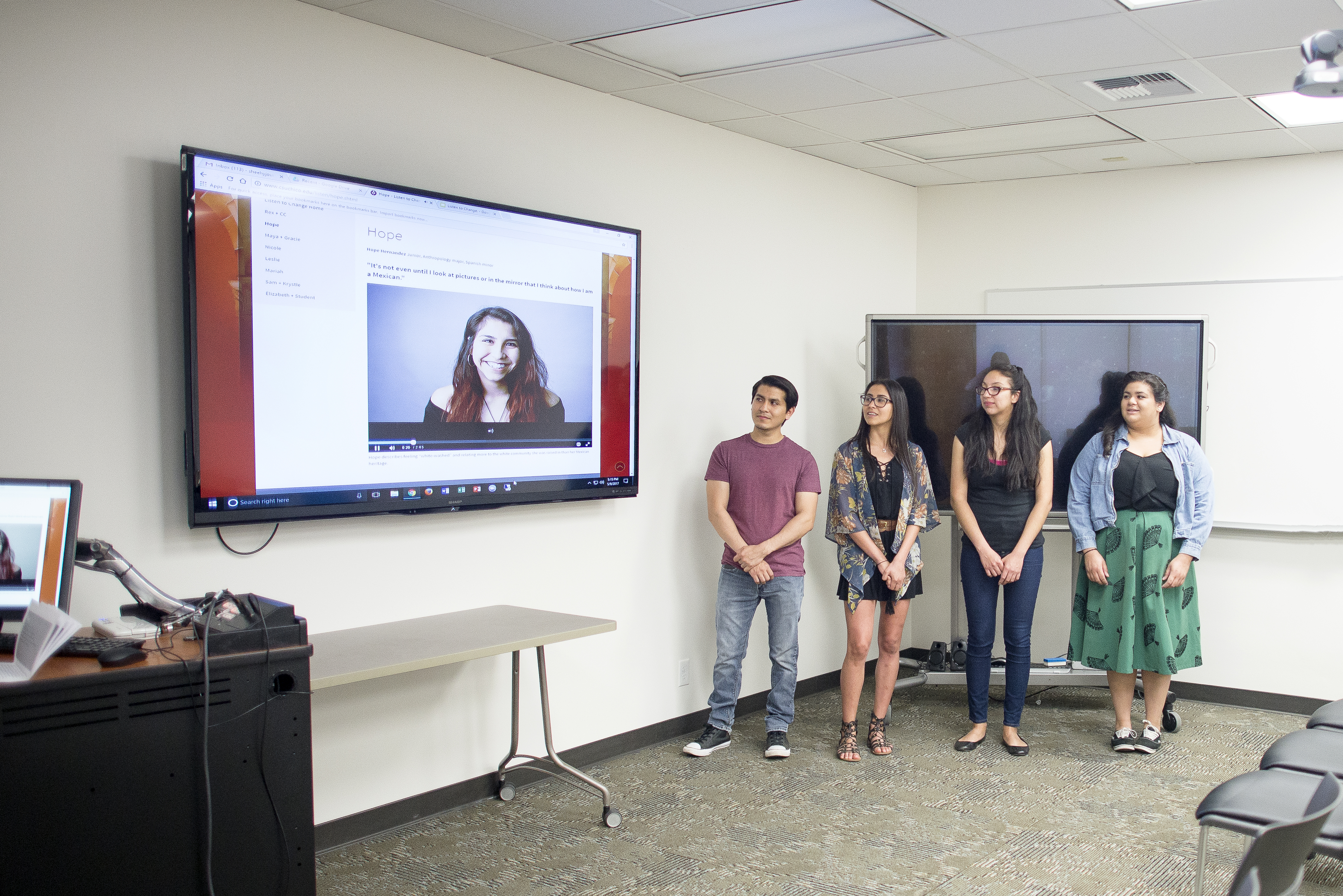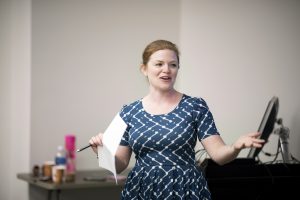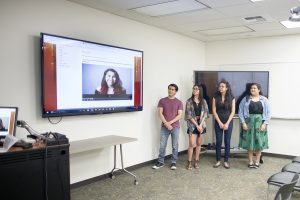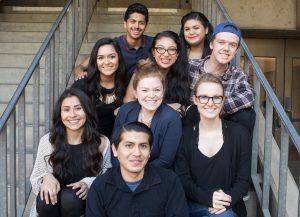Stories Worth Listening To: ‘Listen to Change’ Gives Students a Platform to Share Their Voice

Students (from left to right) Christopher Barbosa, Breanna Barnard, Elizabeth Castillo, and Bianca Quilantan present their Listen to Change interviews in the Meriam Library room 252 on Tuesday May 9, 2017, in Chico, Calif. Listen to Change is the product of Professor Kate SheehyÕs special project class (CME) talking about diversity and inclusion at Chico State. ItÕs a collection of eight interviews of students and staff on campus that is all audio, in a radio interview format. Students researched and interviewed their subjects, and then edited the interviews down to around two or three minutes each. (Jessica Bartlett/ Photographer)
Each of Chico State’s 17,500-plus students walks through campus quietly owning their own story. Some experiences sound familiar, others are unique. But no matter where your perspective resides, one fact remains: Everyone’s story has extraordinary value if you invest the time to listen.
That’s the idea behind Listen to Change, a year-end presentation in Kate Sheehy’s special projects class in the media arts, design, and technology department last spring. Inspired by a Chico State faculty learning committee last fall on diversity on campus, Sheehy thought, “We should interview people on campus and document their stories to highlight diversity and inclusion.”

(Jessica Bartlett / Student Photographer)
As an audiophile, Sheehy (BA, English Literature, ‘05) pulled from her nine years of vast experience working as a reporter at National Public Radio affiliates around the country, including Washington D.C., Las Vegas, and Tucson, Ariz., as well as Chico State’s NPR affiliate during her senior year, where she learned the art of the interview.
“You have to approach people with respect, sensitivity, and find that balance between pursuing a story and also being sensitive to the fact that somebody is sharing a very personal part of their experience with you,” she said.
With support from her department chair, Sheehy created a special projects course specifically designed to tell stories of diversity and inclusion on campus in an audio-only format.
After the class agreed on the voices to feature, Sheehy’s students set up interviews. From there, Sheehy taught her students interview skills and ethics, including interview questions and how interviews would be conducted.
Once each 45-minute interview was recorded, the class spent weeks editing, workshopping, and cutting them down. The end result was eight interviews, each around two to three minutes long. Photographer and lecturer Aaron Draper photographed the student interviewees, and everything came together on the Listen to Change website.
Finally, Sheehy’s class revealed the final products last month, in the Meriam Library and the Cross-Cultural Leadership Center. The interviewees ran the gamut of experiences: a 22-year-old single mother working toward her communications design degree; heartfelt discussions about what it’s like being Mexican or black on campus; a former gang member learning and practicing healthy and productive habits; students that are often misgendered; and an undocumented student.

(Jessica Bartlett / Student Photographer)
The conversations are touching, heartbreaking, and inspiring. Most importantly, though, they’re honest and real, with a clear common denominator: Everyone’s story is worth listening to.
For example, Rex Bell, a junior multicultural and gender studies major, and Charles “CC” Carter, director of the Student Life and Leadership and the Cross-Cultural Leadership Center, discussed hope and hopelessness within the black community on campus, as well as the challenges of hope and love.
“When you look at yourself in the mirror and feel like you’re not worth it, it’s real easy to look at the next brother or sister and say, ‘They ain’t worth it,'” said Bell.
“They shared some really intimate, personal stories. It was a good learning experience for my students, too, because a lot of times you think, ‘nobody’s going to talk to me about that,’” Sheehy said. “But we know, from watching and listening to the news, people talk about everything.”
In this world of multimedia overload, Listen to Change underscored the unique and power of the human voice.
“Radio is probably one of the most human things, because voice is so human,” said junior Bianca Quilantan, a journalism major. “You’re not staring at the person on TV and there’s no judgment. You’re just listening to what the person has to say.”
Quilantan and project partner Sam Pickup interviewed Nicole Coffield, who experienced homelessness after she and her mother faced crippling financial troubles following her father’s untimely death.
“You lose your dad, who is supposed to be this superhero, and then you end up being homeless,” said Coffield, a junior public relations major. “That isn’t supposed to happen to anyone, and you don’t think it will every happen to you. I thought about killing myself sometimes . . . but I also promised my dad that I wouldn’t quit school.”
Pickup, a media arts major, was friends with Coffield during that difficult period.
“When I listened to [Nicole’s] interview over and over, it was just so powerful hearing her experiences and seeing one of your friends go through that, listening it on repeat for hours on end [during the editing process],” said Pickup, a junior media arts major. “It took a lot out of me, it was really impactful.”

(Photo by Aaron Draper)
“One of our team members said, ‘I didn’t even know you were homeless that semester. I knew you that entire time, and had no idea,’” said Quilantan. “I feel like that was the core of this assignment.”
Sharing these very personal and painful stories was made possible only by the care Sheehy and her students put into the class. And the way Quilantan and Pickup tell it, when someone feels valued and respected, trust is earned. And then there’s no telling what you’ll learn if you listen.
“It takes a lot of strength to do that, to tell us you’re undocumented, to tell us that you were homeless, or to tell us that you still don’t feel safe on campus,” said Quilantan. “That takes a lot of courage, and I’m glad I had the opportunity to be able to showcase these stories and present them to the entire campus so everyone knows.”
Sheehy hopes testimonies like these encourage her department to consider offering the course in the future.
“I’m not sure what will happen with this course and project. But it’s something that absolutely has to continue,” Sheehy said. “We can’t do just one semester of this. It needs to be something that’s implemented into the University, as an ongoing project, curriculum, or whatever that may be. This is just skimming the surface.”
Hear all eight interviews at the Listen to Change website.


